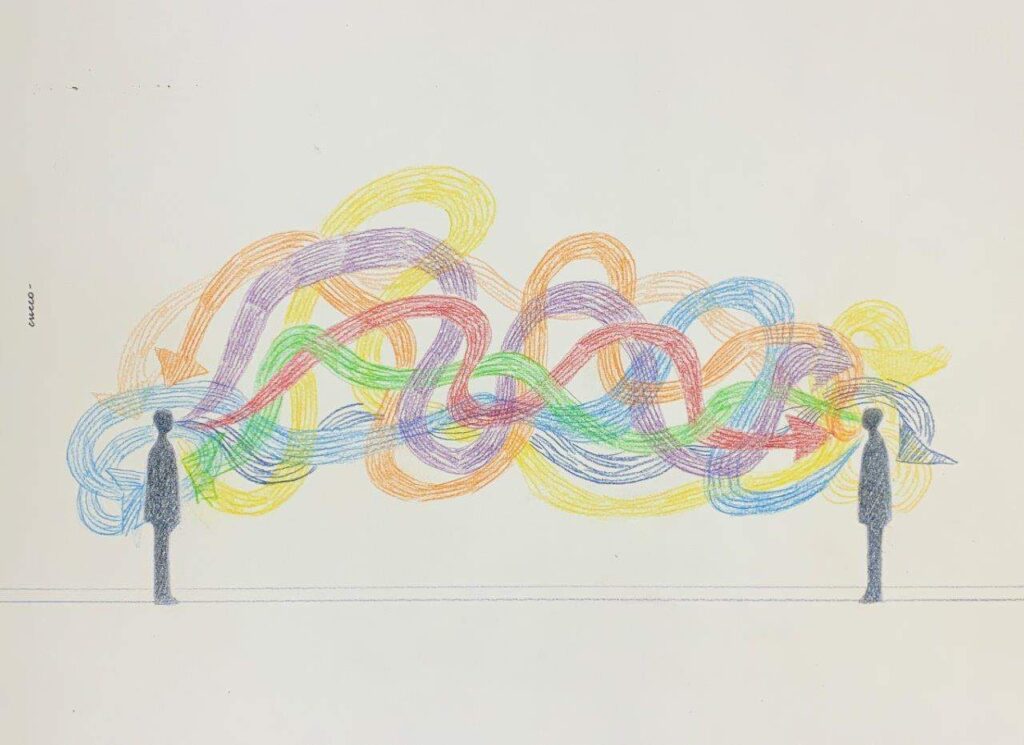Relationship therapy
I offer Internal Family Systems informed therapy for couples/partners, and other pairs including siblings, friends, and parents and children. I welcome people in non-normative relationship structures such as queerplatonic relationships.
How does relationship therapy work?
Our close relationships can support deep growth and healing, but they can also be a cause of profound wounding and disappointment. Our longings to feel heard, held and protected, to find acceptance and be delighted in often awaken in them. They can also evoke the fear, vigilance and painful beliefs about ourselves and others which we carry with us from past events and relationships.
People benefit from relationship therapy for a wide range of reasons. You might be struggling to make a major decision, managing a break in trust, trying to understand your differing needs, neurotypes and attachment styles, or feeling a loss of intimacy and connection.
Internal Family Systems informed relationship therapy is called ‘Intimacy from the Inside Out.’ IFIO can give you a space to develop a deeper understanding of dynamics that happen between you and your partner, and learn to understand the protective strategies you both use to try to get your needs met, as well as the vulnerable parts that each of you are trying to protect.
Every pair is different, however we can often divide relationship therapy into a few key stages.
Exploring what brings you both to therapy, your hopes and your histories
In our first few sessions we will discuss the difficulties you want to explore in therapy and any hopes and concerns you have.
We may also explore your histories and identities, including your experiences of your families of origin, any history of mental illness or addiction, identities such as sexuality, neurodivergence and cultural identity, past experiences of betrayal, apologising and forgiveness, and previous experiences of therapy.
Identifying and pausing patterns of conflict
Conflicts often follow a familiar, repetitive pattern even though the content may change. The idea within IFS is that conflicts are often driven by the attempts of protective parts of us to get the needs met of our most vulnerable parts, but that unfortunately this often brings out protective parts of the other person.
Together we can explore the needs, fears and desires that are behind the protective strategies each of you use. For example, behind parts who are critical, angry, closed off or dishonest are generally parts feeling vulnerable emotions such as fear, loneliness or shame.
We can also figure out how each of you can pause during conflict and speak for the needs and concerns of reactive and hurt parts rather than speaking from them, so that you can turn towards each other with greater curiosity about each others’ experiences.


Helping vulnerable parts
As well as mapping the dynamics that happen between each of your protective parts, we will spend time getting to know the vulnerable parts that drive protective behaviours.
When you can attend to wounded, vulnerable parts of you who have been hurt in the past with compassion and offer them the emotionally corrective experience they need, you can return to previously difficult conversations feeling safer, braver and more able to hear the underlying needs of the other person.
Doing this work in the presence of your partner can not only lessen the need to use protective strategies that often backfire, it can also be deeply connecting, and help each of you understand the vulnerability that is behind your protectors when they show up in the future.
Courageous communication
As we map out the dynamics that play out between you and your partner and work on you both connecting compassionately with protective and vulnerable parts, you’ll both become more able to ‘unblend’ from parts.
Unblending refers to noticing a part (such as a part feeling angry, jealous, scared or lonely) and observing it in a compassionate, curious way rather than seeing the world through its eyes and feeling its emotions. In this state, it is much easier to speak for rather than from parts and listen from the heart when your partner does the same.
Courageous communication is a way of communicating that involves both partners, the speaker and the listener, accessing a calm, compassionate place inside and then communicating about their needs and desires, vulnerabilities and feelings of hurt or remorse, without being taken over by emotions such as judgement, anger, shame or anxiety, which might often get in the way of fully hearing each other.
FAQs
How do we get started?
I start with a full 50 minute session (charged at £35, half my usual fee for a 50 minute relationship therapy session). At the end of our first session I’ll let you both take some time to reflect together on whether to move forward.
You can contact me via the form below or by emailing me at kwintertherapy@outlook.
How will we meet for sessions?
I offer online sessions and work with clients internationally.
I generally use the Psychology Today platform for holding online sessions, which is GDPR and HIPAA compliant, although if you and the person you’re attending therapy with are not in the same location we’ll use a different platform.
What do you charge for a session?
I charge £70 for a 50 minute session and offer a reduced fee of £35 for the first session. I also offer 90 minute sessions for £110. I also have a couple of slots available at £40. If you take one of these slots I will record our sessions so that I can listen back for my own learning, before deleting the recordings.
How about cancellations and rescheduling?
I ask for 72 hours notice if you want to cancel a session completely rather than reschedule.
Regardless of the notice you give me I’ll do my best to offer you alternative slots so you still get the session you paid for, or we can extend our next session to 90 minutes with the fee for the ‘missed’ session covering the extra time.
I try to be flexible when it comes to changing session times, and I’m happy to work with clients with unpredictable or varied schedules.
How often will we meet?
I generally see clients weekly for 50 minute sessions, although if you prefer we may be able to meet:
- less frequently, e.g. once a fortnight or month.
- 2+ times a week.
- for 90 minutes rather than 50 minutes.
Feel free to ask me if one of these options or something similar would suit you.